Estonian World brings reactions as US-Europe alliance fractures over Ukraine – after a heated clash between Donald Trump and Volodymyr Zelensky, Estonian politicians call for greater European autonomy, stronger support for Ukraine and a reassessment of transatlantic ties.
The most serious rift between the United States and Europe since the Second World War has emerged, fuelled by disagreements over how to end the war in Ukraine. As tensions rise, an increasing number of Estonian politicians are calling for greater European autonomy and adopting a more critical stance toward the Donald Trump-led United States, Estonia’s ally for over a century.
The heated confrontation between the US president, Donald Trump, and the Ukrainian president, Volodymyr Zelensky, in the White House’s Oval Office on 28 February has only deepened concerns. Many Estonian leaders and security experts backed Ukraine while sharply criticizing Trump and Vice President JD Vance – although some suggested Zelensky might have benefited from a more measured approach.
Please see also Estonian World’s special blog on Ukraine, running since 24 February 2022.
3 March – Former PM Ansip: some European countries need a wake-up call
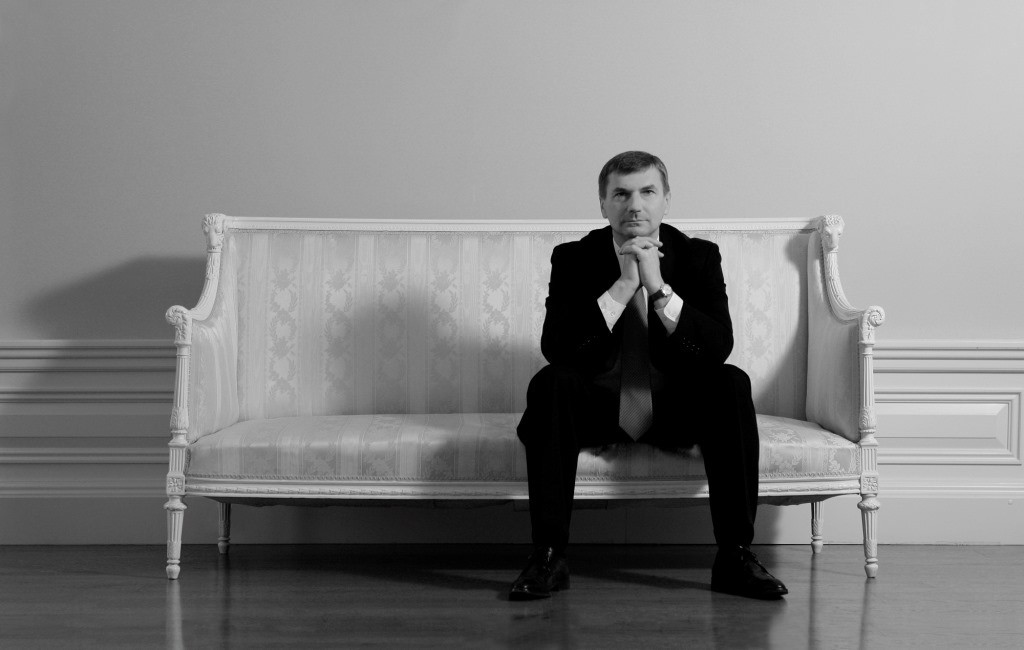
Andrus Ansip, a former prime minister of Estonia and a former EU official, said that, even though he doesn’t like president Trump’s actions, his bluntness on Europe and Ukraine may actually be necessary as some European countries need a wake-up call.
“Trump’s wake-up call to Europe is necessary – not for some countries, but definitely for some others. It’s very necessary right now as everybody understands that the situation is complicated. At the same time, there’s no reason to over-dramatize it as all the signs are showing that Russia’s military situation is weakening,” Ansip said, according to the Estonian Public Broadcasting.
2 March – President Karis: assuring Ukraine of continued military support is key
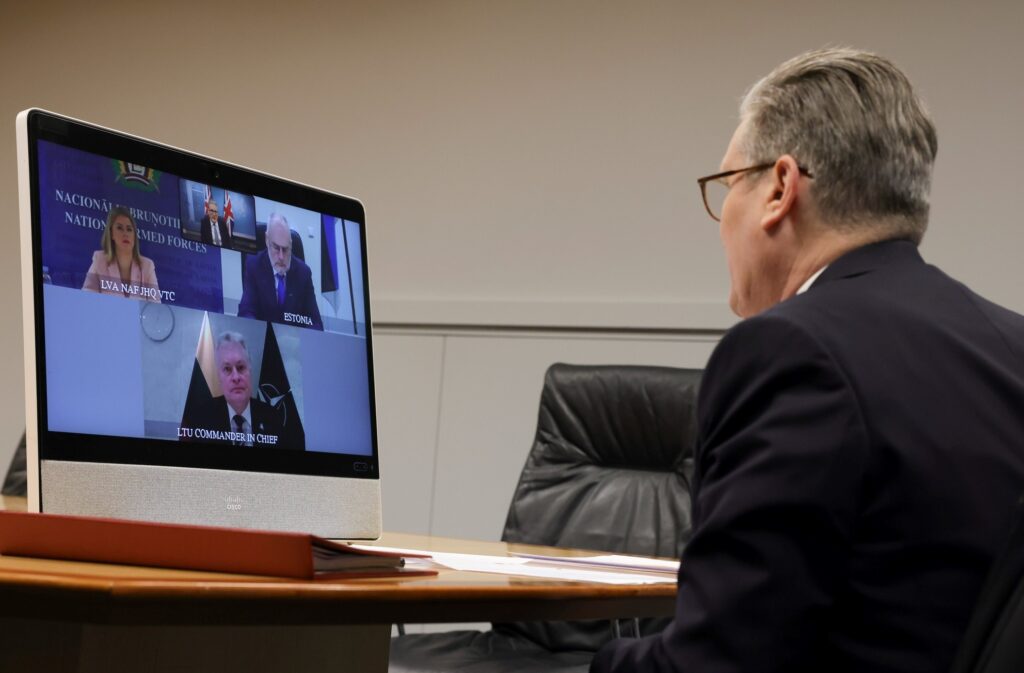
The Estonian president, Alar Karis, in a video call with the UK prime minister, Sir Keir Starmer, and the leaders of Latvia and Lithuania, emphasised that Europe must assure Ukraine of ongoing military aid and be ready to increase support. He stressed that Ukraine’s security is vital for all of Europe and called for higher defence spending and preparedness.
Karis also welcomed UK and French-led discussions on security guarantees for Ukraine, stating that Europe must take the lead, with US support remaining crucial. Estonia is open to security guarantees but insists they must be credible and deterrent.
2 March – Estonian populist leader blames Zelensky for US fallout, backs Trump’s “peace plan”
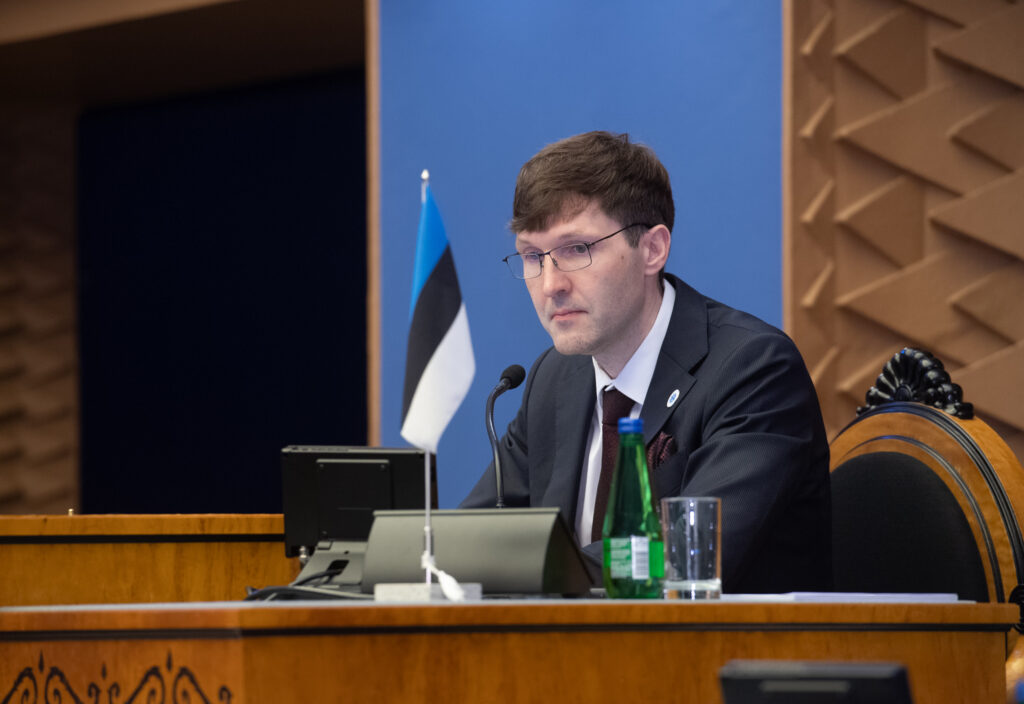
As the Western leaders react to the latest rupture in Ukraine’s relationship with the US, Estonia’s political establishment has largely condemned the treatment of Volodymyr Zelensky during his recent visit to Washington. But Martin Helme, leader of the far-right Conservative People’s Party of Estonia, known as EKRE, sees things differently – Zelensky, in his view, brought it on himself.
In a fiery social media post, Helme accused Zelensky of deliberately sabotaging negotiations, dismissing diplomacy and miscalculating his leverage with Donald Trump. “He went to Washington expecting unconditional support and instead found himself publicly rebuked,” Helme wrote. “He tried to lecture Trump on peace, only to be told to come back when he was ready for it.”
Helme claims the US had offered Ukraine a strategic investment deal in exchange for natural resource access – Kyiv’s best shot at securing long-term economic stability and indirect security guarantees. But instead of seizing the opportunity, Zelensky allegedly leaked the terms, then engaged in a public standoff with Trump’s team, demanding NATO membership and further military aid. “That is simply not how things are done,” Helme fumed. “He thought he could blackmail Trump and got exactly what he deserved.”
The fallout, Helme suggests, is dire. With Trump’s camp signalling an immediate halt to military aid and dismissing Ukraine’s war effort as a reckless gamble, Helme warns that Eastern Europe could be next in line for a catastrophe. “If Ukraine collapses, so does our security,” he wrote. “And those who attack Trump while praising Zelensky are leading Estonia to destruction.”
For Helme, the takeaway is clear: Trump’s diplomatic approach – pressuring Ukraine toward a negotiated settlement – is the only path to stability. Anything else, he argues, is a dangerous illusion.
2 March – Baltic states not invited to the London summit
Security expert Erkki Koort criticises the exclusion of the Baltic states from an upcoming London summit on European security, despite Estonia, Latvia and Lithuania’s significant contributions to Ukraine’s defense.
While 18 countries were invited, the absence of the Baltics is striking, especially as some lesser-contributing nations received invitations. Koort suggests this omission reflects broader geopolitical shifts, with London asserting its leadership role in Europe, while the US drifts closer to Russia.
He warns that such decisions send troubling signals to adversaries like Russia and China, who interpret diplomatic divides to their advantage. The situation, he argues, demands a reassessment of Estonia’s foreign policy influence – although the fault may not lie with Estonia itself.
2 March – a diplomatic gamble gone awry
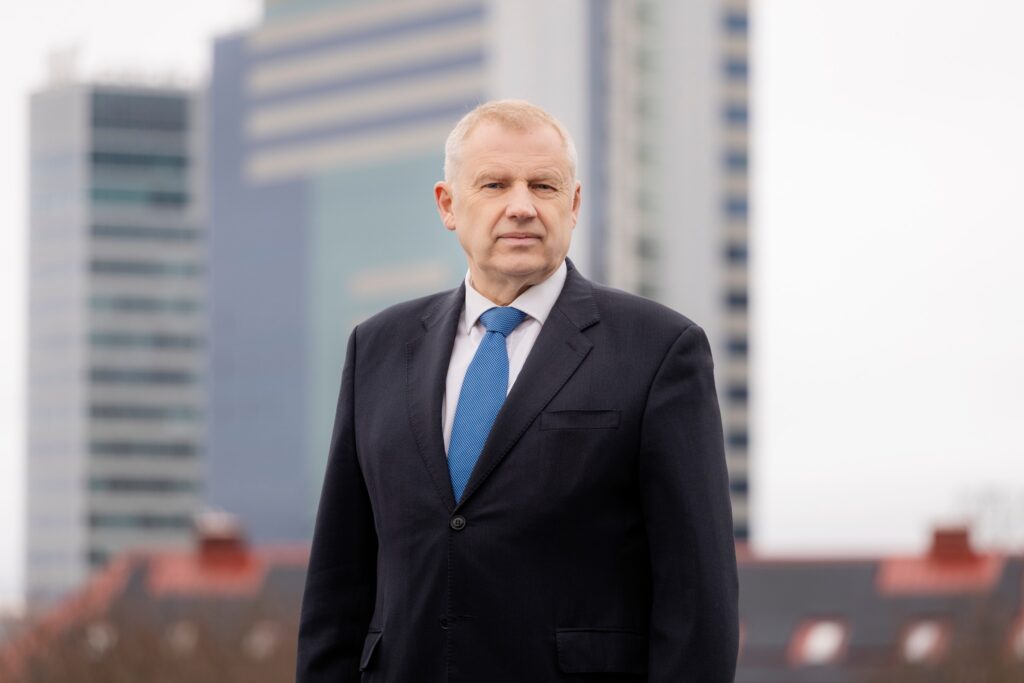
Neither Donald Trump nor Volodymyr Zelensky emerged unscathed from their tense meeting in Washington, which quickly descended into a war of words. The Ukrainian president, hoping to secure assurances of continued US support, instead found himself caught in a political spectacle that did little to advance Ukraine’s strategic position. Security expert Rainer Saks, in an interview with Estonian Public Broadcasting, characterised the meeting as highly emotional, even absurd – suggesting that the current US administration is rewriting diplomatic norms in a way that others must now reckon with.
Trump appears more concerned with optics than with the substance of negotiations. His priority, Saks argues, is simply to be seen bringing both sides to the table, rather than crafting a clear roadmap for ending the war. He lacks a coherent vision for what a peace deal should entail or how to achieve it.
While Europe has largely condemned the way Trump and his vice president treated Zelensky during the meeting, Saks notes that beyond statements of support, European leadership has failed to take serious diplomatic initiative. He warns that without sustained diplomatic pressure on Russia, any meaningful peace process remains unlikely.
For Ukraine, the meeting may have backfired. Despite Zelensky’s defiance in the face of Trump’s improvisational style, the underlying reality remains: Kyiv is deeply dependent on US support, much of which has already faced delays. Saks pointed out that American assistance to Ukraine has been multi-layered, extending far beyond financial and military aid. The intelligence-sharing aspect has been crucial. According to Saks, even Russian President Vladimir Putin has acknowledged that the most significant damage to Russia’s war efforts has come from intelligence provided to Ukraine by the US.
Beyond battlefield intelligence, the US has played a key role in supplying advanced weaponry, logistical support, and training Ukrainian forces. However, problems with the delivery and fulfilment of previously promised aid have persisted, raising concerns about long-term reliability. Saks argues that while Ukraine may be able to sustain itself temporarily without fresh American commitments, replacing US assistance with alternative sources would be extremely difficult. The depth of American involvement in Ukraine’s defence infrastructure is such that no other ally can easily fill the gap.
While Zelensky has been celebrated for standing firm in Washington, Saks questions whether the trip was necessary at all. Given Trump’s unpredictable nature, the risk of a public confrontation was high – something Ukraine should have anticipated. In the end, neither side walked away with a victory, and the long-term consequences for Ukraine’s Western alliances remain uncertain.
1 March – former president Ilves: we can’t trust the US anymore
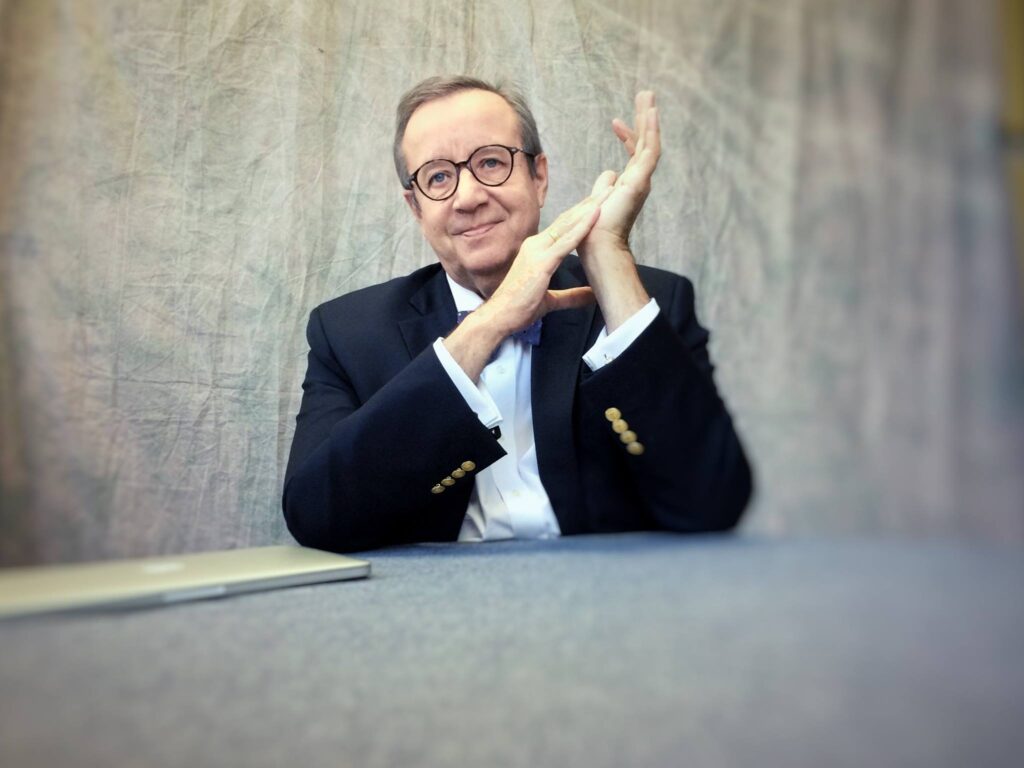
Toomas Hendrik Ilves, a former president of Estonia, told the Estonian Public Broadcasting that it was awful to watch the meeting of the heads of state of the United States and Ukraine, and that Europe now has to seriously work on getting by without the US.
“Friday showed us that the Trump administration has largely taken over the talking points of Russia,” Ilves said. He noted that everyone in Europe have to draw their own conclusions now and acknowledge that the US cannot be trusted anymore, that we have different goals and if we want to defend the values of the West, then the US won’t come to our aid.
“After yesterday, I strongly doubt that NATO has any significance anymore. Even if the US won’t leave NATO with Trump at helm, we still can’t hope for much from it should things get grim. Europe will have to think much more seriously how to go forward on its own and how to defend itself, which means that a lot of that bickering we’re used to seeing in Europe has to end now,” Ilves told the public broadcasting.
1 March – defence minister Pevkur: Europe’s responsibility is growing
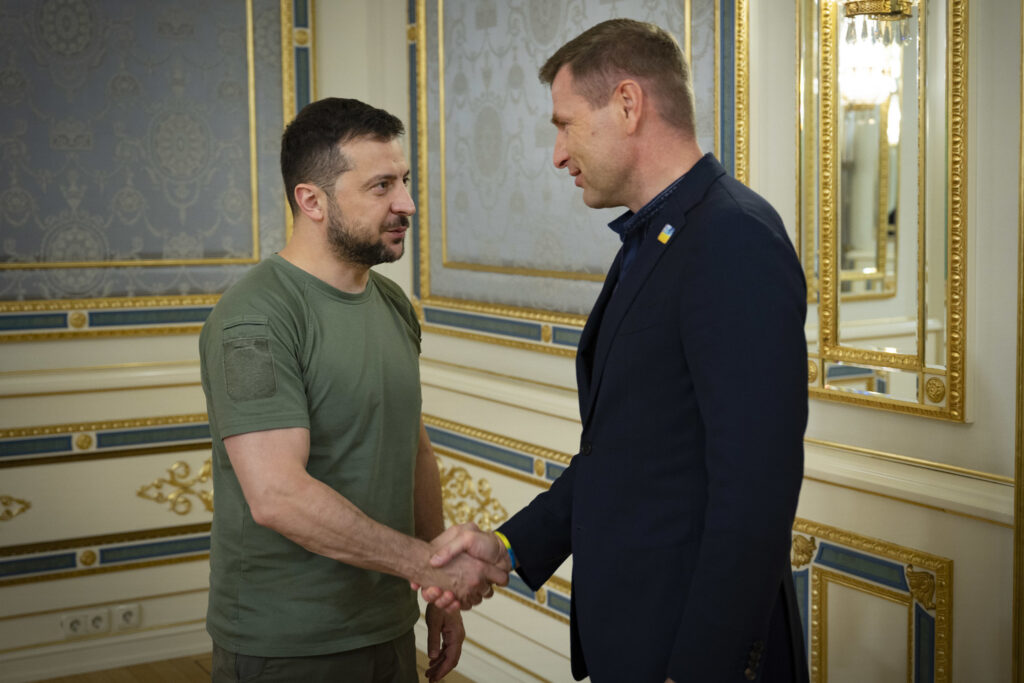
Hanno Pevkur, the Estonian defence minister, said on social media that the meeting between Trump and Zelensky confirms that the rules of the security of Europe are changing and that Europe’s own responsibility is growing.
“We have to act decisively: support Ukraine, raise the defence expenditures and cherish the unity of Europe,” Pevkur said.
“It’s now a common understanding that we’re closer to the end of the war in Ukraine than we’ve been in the past three years. However, so that the end would be acceptable for Ukraine, Estonia and Europe, especially Europe now has to make a great effort in increasing military aid to Ukraine and give it a better position for negotiations.”
Pevkur also noted that Europe got a clear message from the Trump-Zelensky meeting – it’s time to quit dragging their feet. “Supporting Ukraine and, through this, assuring the security of Europe and also Estonia is first and foremost the responsibility of Europe.”
1 March – foreign minister Tsahkna: It is time to act now
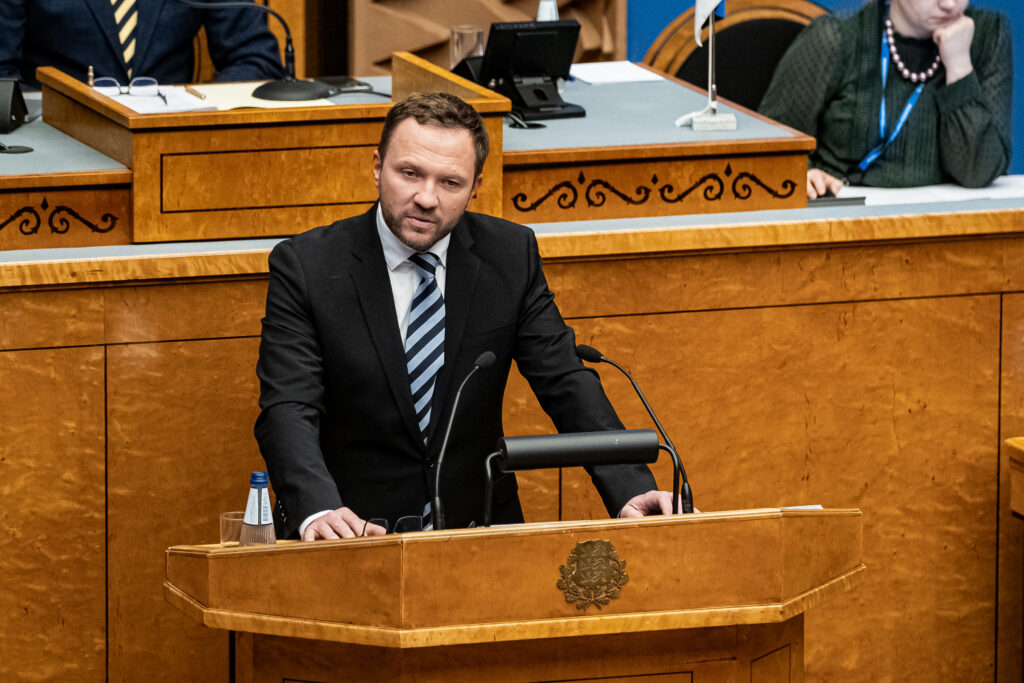
The Estonian foreign minister, Margus Tsahkna, said it was clear that it’s time for Europe to move from words to actions, and to show and prove that we can support Ukraine and counter Russia’s aggression. “If the USA decides to halt its aid to Ukraine, Europe must step in to replace it and we have the necessary resources,” he noted.
“To achieve a lasting and just peace, we need to put pressure on the aggressor and support the victim of the aggression. We must increase our military assistance to Ukraine as soon as possible, improve the sanctions imposed on Russia, and mobilise the nearly €300 billion worth of frozen sovereign assets of Russia located in Europe.”
“A lasting and just peace is possible only if Russia stops fighting. If Ukraine is forced to stop fighting, the aggressor will have achieved its goal. However, this would only be the beginning of its demands,” Tsahkna said.
1 March – the disintegration of the Western alliance?
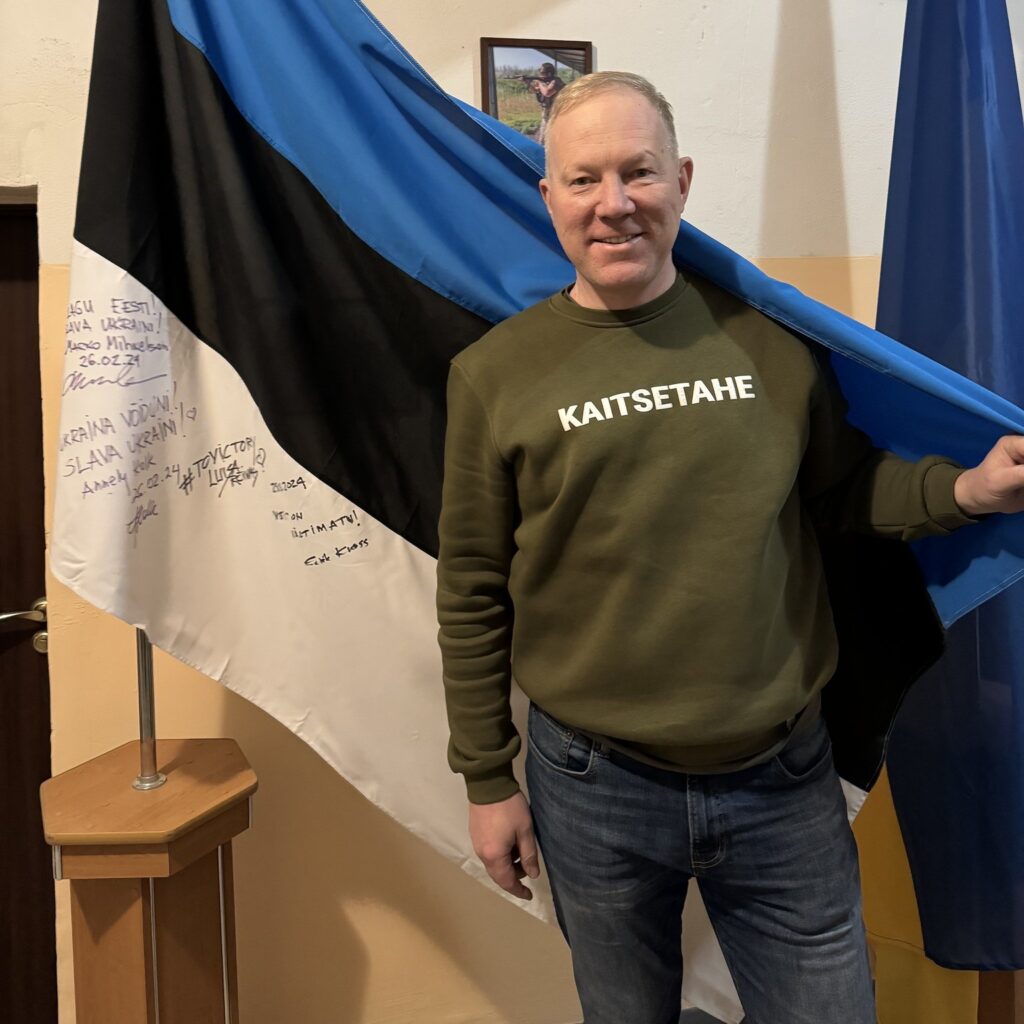
Marko Mihkelson, the chairman of the Estonian parliament’s foreign affairs committee, wrote in social media that the world watched in stunned disbelief yesterday as an unprecedented diplomatic spectacle played out in the Oval Office – an event so dramatic that even Hollywood’s sharpest screenwriters might have struggled to script it. “This moment may well be remembered as the beginning of the unravelling of the Western alliance,” he remarked.
Mihkelson observed that not since the end of the Second World War has such a profound and fundamental rift emerged among the free world’s allies. “Russia and China – long intent on driving a wedge between Europe and the United States – have come perilously close to achieving one of their most ambitious strategic goals.” He noted that President Trump, the standard-bearer of modern isolationism, made one thing abundantly clear: “the leadership of the free world is now vacant.” It is up to America’s traditional allies to decide whether anyone will step in to fill the void.
According to Mihkelson, what transpired in the Oval Office was as shocking as it was inevitable. The encounter between President Trump and Ukraine’s Volodymyr Zelensky unfolded like a preordained tragedy. “Zelensky was handed nothing less than an ultimatum –one that might as well have been written in the Kremlin,” Mihkelson said. When the Ukrainian president sought to remind his hosts that Russia is the aggressor, that it has repeatedly violated ceasefires since 2014, and that Ukraine’s survival depends on genuine security guarantees, he was met not with support but with scorn. His American hosts excoriated him, accusing him of “ingratitude and arrogance.”
Mihkelson acknowledged that “Zelensky did not have his best day,” but emphasised the immense pressure the Ukrainian president has been under for months. “Even he, perhaps, had not expected that Ukraine’s strongest ally would so openly and brutally turn its back on the victim of aggression,” Mihkelson noted.
President Trump’s stance was unwavering. He presented himself as a leader detached from the war, refusing to take sides, seeking only to end the conflict at any cost – even if that meant ceding to Russia’s demands. Mihkelson described Trump’s performance as a stark declaration that he “cares little for the principles enshrined in the UN Charter, the inviolability of national borders, or the values that have bound the free world together for decades.”
In a post-meeting statement, White House Press Secretary Caroline Leavitt left no room for doubt. The US, she declared, would no longer write “blank checks for a war in a very distant country without a real and lasting peace.” Mihkelson interpreted this as a clear signal: “Trump needed this spectacle to publicly sever ties with Ukraine’s war effort – a war that will ultimately define the future of Europe.”
Mihkelson linked this latest development to a broader pattern in the Trump administration’s foreign policy. “It began with Trump’s now-infamous phone call with Vladimir Putin on 12 February – a conversation whose details remain murky but whose consequences are becoming starkly apparent.” Since then, the White House has taken erratic yet calculated steps to reset relations with Russia – at Ukraine’s and Europe’s expense. Mihkelson pointed to recent US votes at the UN Security Council and General Assembly, where the US aligned itself with Russia and North Korea against Ukraine, as a clear indication of this shift.
Attempts by the Ukrainian delegation to re-establish communication with the White House after the debacle in the Oval Office were rebuffed. Mihkelson noted that Zelensky left Washington with a grim realisation: “Ukraine could no longer count on American support as it once had.” The burden of Ukraine’s survival now falls squarely on Europe.
For Estonia and other nations with similar histories, Mihkelson warned, the potential collapse of the Western alliance is nothing short of a catastrophe. If Russia and China perceive Western deterrence as crumbling, the implications for peace and security in Europe could be dire. “The immediate test of Europe’s resolve will be ensuring the continued flow of military aid to Ukraine,” he wrote.
Even if the US follows through on its threat to freeze previously promised support, Europe –and the broader free world – must ensure that aid does not falter. “The immediate priorities remain unchanged: artillery, ammunition, and air defence.” None of this will be easy, Mihkelson acknowledged, but in the face of an existential threat, it is unavoidable. He reiterated Estonia’s proposal to allocate at least 0.25% of GDP to Ukraine’s military assistance as an urgent necessity.
European nations must also move swiftly to repurpose all frozen Russian assets for Ukraine’s benefit. “If this requires persuading the Belgian government – custodian of the majority of the €200 billion in frozen Russian funds – then that must be done,” the chairman of the foreign affairs committee insisted.
He stressed that Europe must prepare itself for a new geopolitical reality. “Defence budgets must be adjusted accordingly.” Meeting the current 2% of GDP target is no longer sufficient; military expenditures in the range of 4-5% may soon become the new norm.
That said, Mihkelson warned that even if political decisions are made today, it will take time for Europe to develop the necessary military capabilities. “This is why a critical step must be taken now: France must extend its nuclear deterrent to all European allies.” Moscow must understand that Europe is serious about its defence.
Despite the bleak developments, Mihkelson argued that Europe must not abandon efforts to engage the US. He referenced Trump’s response to a Polish journalist’s question about Baltic security, in which the president acknowledged that the region faces “a tough neighbourhood” but reaffirmed that he remains bound by NATO commitments. “Despite everything, Europe must remain engaged,” Mihkelson wrote, emphasising that most members of the US Congress still support strong transatlantic ties and recognise that abandoning Ukraine could, paradoxically, bring the world closer to a Third World War.
“The events of the past 24 hours have shaken the foundations of the Western alliance,” the MP concluded. “But history is not yet written. Europe must now prove that its commitment to Ukraine – and to the very principles of the free world – is more than just rhetoric.”
1 March – Estonian president: “You are not alone”
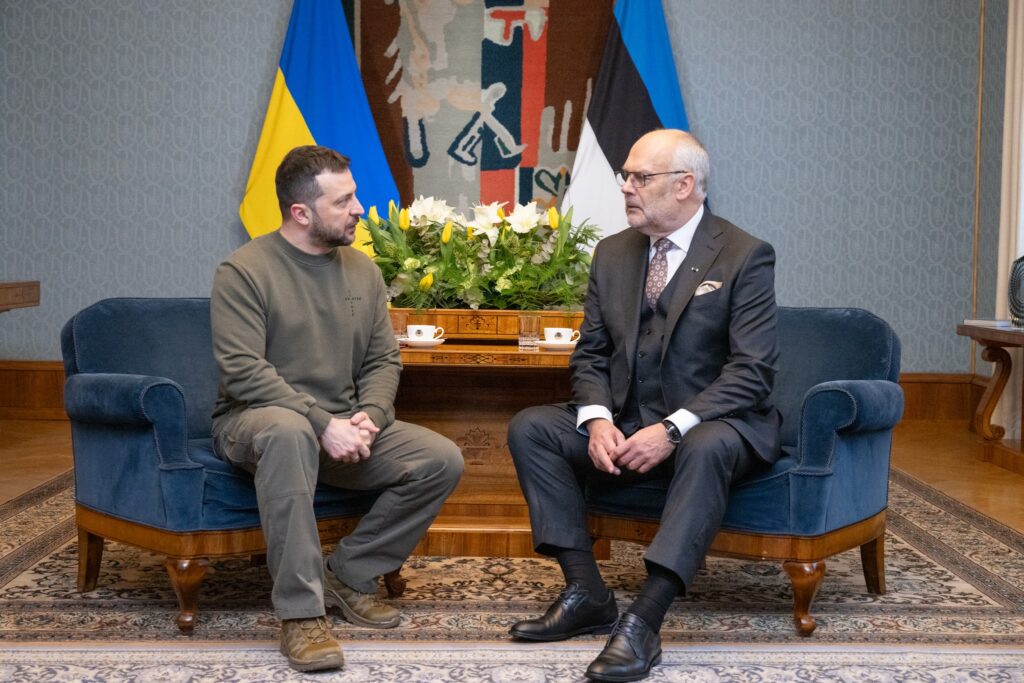
The Estonian president, Alar Karis, stated on X (formerly Twitter): “Estonia’s support for Ukraine is unwavering. Your courage inspires us all. We stand with you, President Zelenskyy, and the people of Ukraine. You are not alone.”
1 March – Zelensky’s visit to Washington – a strategic misstep?
Rainer Saks, a former chief of Estonian Foreign Intelligence and now an independent security expert, has described President Zelensky’s visit to Washington as a meeting of little necessity. In retrospect, it appears that President Trump and his vice president sought to pressure the Ukrainian leader into endorsing a US-led peace initiative during a staged media event – much like Trump’s previous attempts to coerce Jordan’s king into compliance. At the same time, Zelensky’s visible sensitivity and highly emotional response to Trump’s remarks suggest a level of reactivity that may have been avoidable. A more measured approach might have served him better.
The fundamental miscalculation on the part of the Trump administration remains its failure to grasp that Ukraine’s fight is not just about territorial control but about its very survival as an independent nation. No external pressure, even from Washington, can force Kyiv into a premature peace settlement. Even Moscow appears to recognise that improving its ties with the US is a means to bolster its own strategic position rather than a route to an immediate peace deal.
For President Trump, domestic political considerations loom large, and the coming days will reveal whether he fully comprehends the consequences of his actions. Zelensky, too, might have benefited from greater strategic restraint. Given the trajectory of recent events, it should have been clear that rushing to Washington was unlikely to yield any meaningful advantage –and that outmanoeuvring the US president so swiftly was unrealistic. Despite strong statements of support from European leaders, Ukraine’s long-term ability to resist Russian aggression still hinges on sustained and effective military assistance from the United States.
Meanwhile, US officials have accused Zelensky of missteps and are demanding an apology. Yet, they fail to acknowledge that it was their own administration that staged what has become a diplomatic miscalculation – one that has, in turn, eroded the credibility of the US presidency on the global stage. The more Washington publicly pressures Ukraine’s leader, the stronger his image becomes at home and abroad, while the US administration risks appearing increasingly unreliable.
For Russia, this misstep represents an opportunity. Western media is already speculating on whether Washington will scale back military support for Kyiv and how long Ukraine can sustain its defences without it. This narrative shift offers the Kremlin tactical leverage in shaping perceptions and influencing strategic decision-making. As Moscow remains uninterested in an expedited peace process – seeking instead a ceasefire on its own terms – there is little reason to expect any immediate change on the battlefield.
1 March – Kaja Kallas: “The free world needs a new leader”
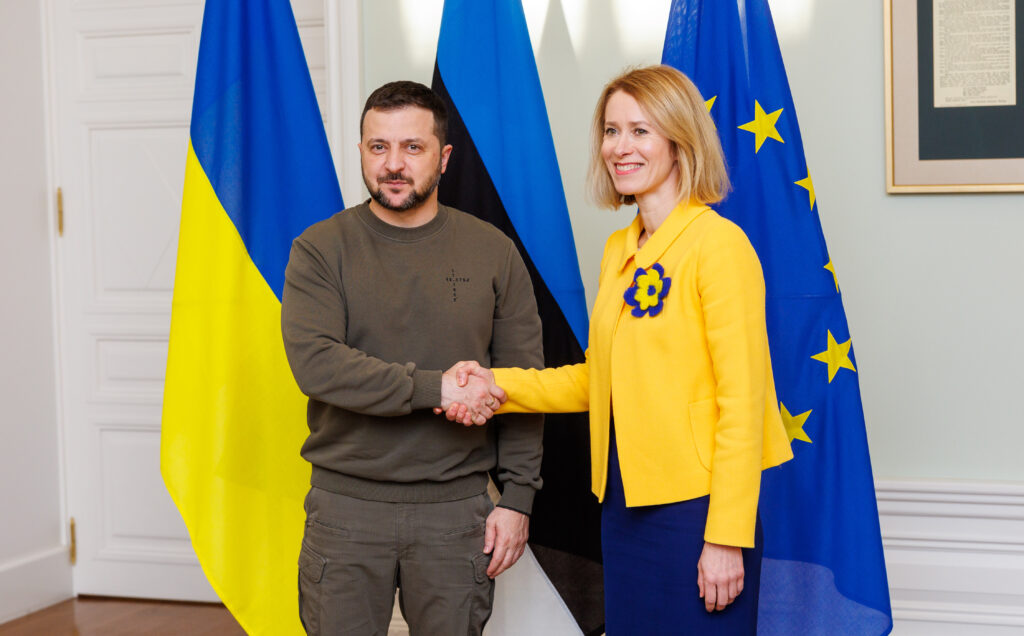
Kaja Kallas, a former Estonian prime minister and now the EU’s high representative for foreign affairs and security policy, took to X (formerly Twitter) to voice her position:
“Ukraine is Europe! We stand by Ukraine. We will step up our support so they can continue to fight back against the aggressor. Today, it became clear that the free world needs a new leader. It’s up to us, Europeans, to take on this challenge.”
1 March – PM: “We stand with Zelensky”
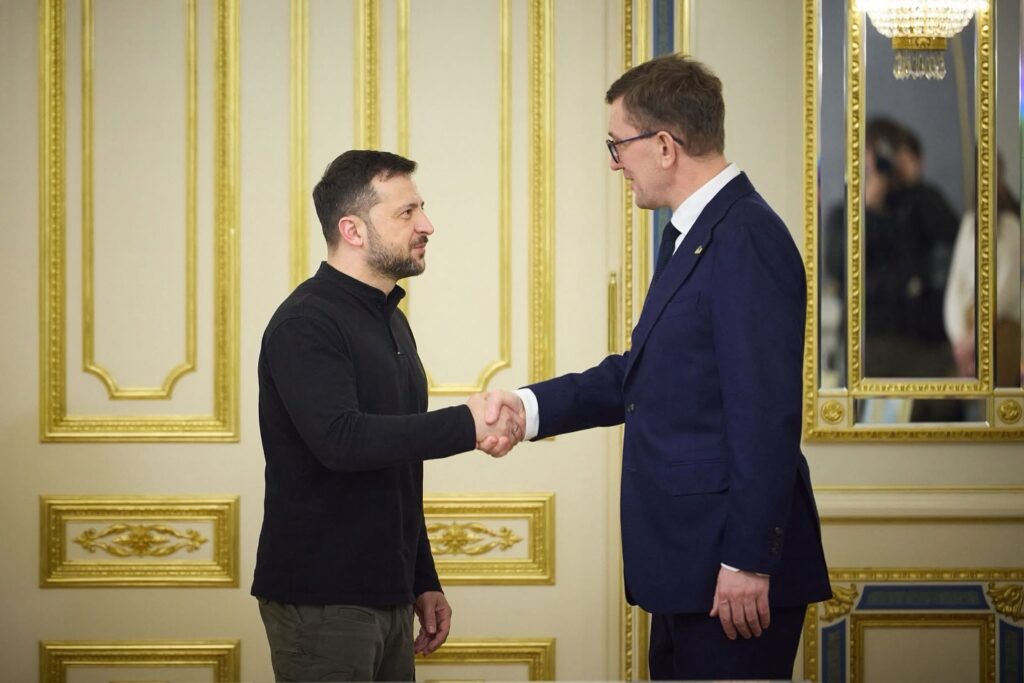
The current Estonian prime minister, Kristen Michal, stated on the social media, “We stand with President Zelensky and support Ukraine. Always. Because it is right, not necessarily easy.”
1 March – Urmas Paet: “A new low has been reached”

Urmas Paet, a former Estonian foreign minister and current MEP, described the situation as unprecedented:
“I can’t recall any similar globally staged drama at the level of a meeting between world leaders in recent decades. Especially between countries that have long been close allies – one of which, Ukraine, remains a victim of Russian aggression.”
Paet condemned what he called a new low in international relations, where the victim of aggression is forced to publicly express gratitude and justify itself.
“The victim has to justify itself! The conclusion from this situation, unfortunately, is the same as the one we have already been forced to make multiple times in recent weeks due to Trump and his team – Europe must swiftly and fundamentally reassess its strategies.”
He outlined the urgent priorities for Europe:
- Strengthening its own security
- Providing greater support to Ukraine
- Building alliances beyond Europe – with Canada, Australia, Japan, and South Korea
- Taking decisive action in trade policy, in response to Trump’s decision to impose 25% tariffs on EU products, considering both its impact and necessary countermeasures
Paet warned that Trump’s expectation of total compliance from Ukraine, regardless of its future consequences, had led to a humiliating public spectacle. He suggested that even Russian officials must be watching in disbelief – but also with satisfaction, as they adjust their own strategies.
“Europe’s new awakening has begun – out of necessity,” Paet said.
1 March – MP: “The meeting had only one winner – Putin”
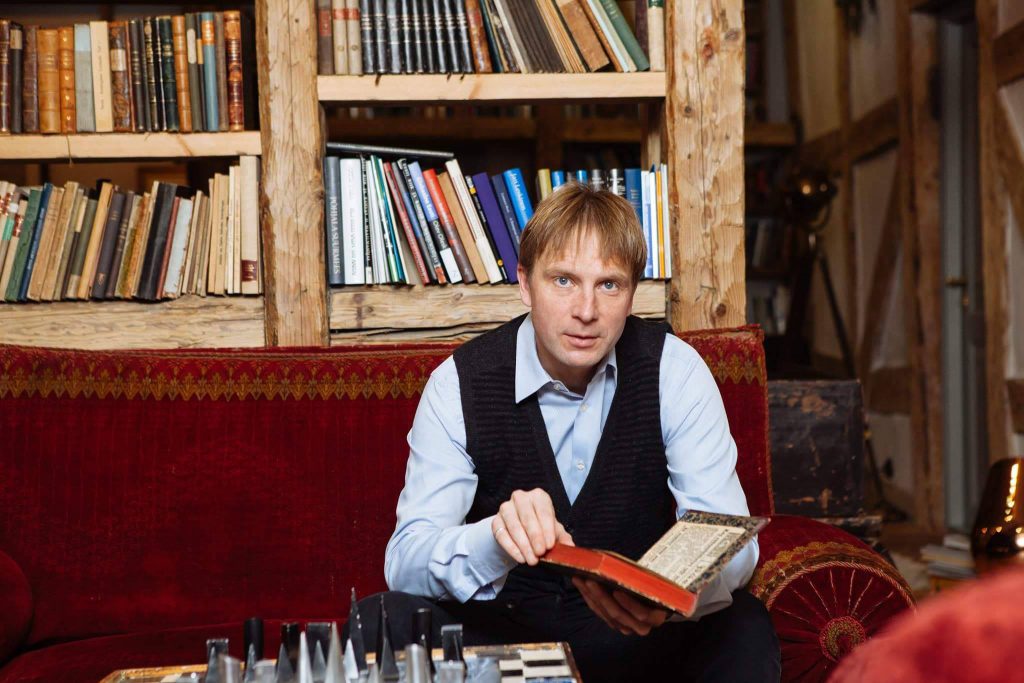
According to Eerik-Niiles Kross, a member of the Estonian parliament’s foreign affairs committee, today’s meeting resulted in a victory only for Russia and its president, Vladimir Putin, while those present lost.
The future dynamics between the US, Ukraine, Europe and Russia following the disgraceful situation at the White House will become clear in the coming days, Kross stated. “It is possible that the reaction from the largely pro-Ukraine US public will push the Trump-Vance team back on track,” he told Estonian online portal Delfi.
“It is also possible that the public humiliation of Zelensky, seemingly pre-planned and carried out mainly by Vance, was necessary to provide Trump with an excuse to withdraw from the ‘peace process’ while blaming Zelensky for the failure,” Kross added. “It is unlikely that Trump has received any indications from Putin about a willingness to compromise. I believe this is the real reason behind the Trump-Vance outburst.”
According to Kross, the long-promised “deal” appears to be non-existent – unless it means Ukraine’s total capitulation. “In any case, this meeting had only one winner: Putin. Everyone else present turned out to be losers,” he said.
“It is evident that Zelensky does not need Trump’s help to hand over four regions to Putin, reduce the Ukrainian army, and abandon NATO aspirations,” Kross noted. “If he wanted to surrender to Putin, he would go to Moscow, not Washington.”
Kross emphasised that the upcoming meeting between European leaders and Zelensky in London on Sunday is of utmost importance. “Europe has a historic opportunity to take an active and decisive role in the most significant geopolitical process of this century,” he added.
“In broad terms, US military aid accounts for about 20% of the total cost. Ukraine itself contributes around 55%, while Europe and non-US countries provide 25%,” Kross explained. “Europe must not only cover the missing 20% but significantly increase its support.”
Kross stressed the urgent need to resolve the issue of frozen Russian assets, be prepared to ensure Ukraine’s security with European forces, and immediately boost Europe’s defence industry.
1 March – Postimees editor: Trump’s treatment of Zelensky weakens US authority

Sergei Metlev, editor-in-chief of the Russian-language edition of Postimees, delivered a stark critique of Donald Trump’s treatment of Ukrainian President Volodymyr Zelensky, calling it a humiliation that erodes America’s authority and dignity. Trump, he argued, not only exploited Zelensky’s limited English but also falsely accused him of ingratitude – reducing a leader who has spent years confronting existential threats to a political prop in Washington’s power games.
Beyond the personal affront, Metlev highlighted the troubling geopolitical signals. Trump’s recent, undisclosed conversation with Vladimir Putin – revealed without formal announcement – suggests a willingness to engage Moscow without transparency. His reluctance to offer future security guarantees and insistence that peace could be achieved through a resource-driven deal, absent any concrete commitments, reflects a transactional approach that disregards Ukraine’s survival.
Yet, Metlev’s disappointment was also reserved for Zelensky himself. “Despite all my sympathy, I was sadly astonished by how Zelensky persistently tried to get Trump to support Ukraine and oppose Putin directly in the Oval Office – and how he fell for the vice president’s provocation,” he observed. The misstep extended beyond the White House, as Zelensky doubled down on Fox News, failing to grasp the political realities of Washington. “Words that Europeans understand carry no weight there,” Metlev concluded – a painful reminder that Ukraine’s fight is as much about perception in the West as it is about survival at home.
US President Donald Trump and Ukrainian President Volodymyr Zelensky met at the White House on 28 February to sign an agreement granting the US access to Ukraine’s natural resources. Instead, the situation escalated sharply – Trump and his vice president orchestrated a diplomatic failure, and Zelensky left earlier than planned.

